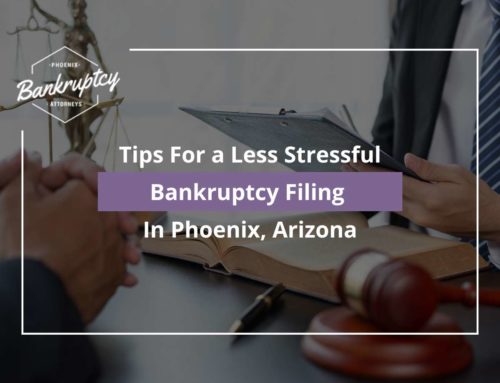Now that the dust is finally settling from the COVID-19 pandemic, companies across a variety of industries are declaring bankruptcy. With the current state of the economy, countless factors could push a business into bankruptcy court. Some companies can keep their financial affairs under wraps until the petition is filed, while others will hear rumors of bankruptcy until filing. The latest subject of such gossip is an airline known by some for its budget prices, and by others for its lack of free bags and rowdy flights. While it’s common to see businesses in categories like restaurants and designer clothing go under during times of inflation, an airline filing for bankruptcy could signal a larger shift in the economy. Read on to learn more about this potential bankruptcy case and the different chapters of bankruptcy available. If you are seeking quality bankruptcy representation in Phoenix or Tucson, Arizona, call 480-263-1699 to schedule your free consultation with our firm.

Spirit Airlines Supposedly Heading for Chapter 11 Bankruptcy
Experts are forecasting that Spirit Airlines will soon be filing for Chapter 11 bankruptcy after a failed acquisition attempt by JetBlue. The potential merger was worth $3.8 billion, but a federal judge ruled that the merger couldn’t proceed as it violated antitrust law. Spirit Airlines has been struggling in recent years and has $1.1 billion in debt set to mature next year. The JetBlue merger would have been a lifeline for Spirit Airlines. It now has to seek another buyer or continue as a solo operation. Frontier was set to purchase Spirit Airlines before JetBlue came into the picture, but Frontier’s current situation makes that solution unlikely. Additionally, JetBlue and Spirit may appeal the decision to prevent the two from merging. The judge didn’t grant the government’s request for a permanent injunction against the two companies merging, so there may be hope to overturn the judge’s decision. However, many experts predict that this ruling has sentenced Spirit Airlines to bankruptcy.
If Spirit Airlines files for bankruptcy, experts predict that it will be Chapter 11 bankruptcy. Many large companies use Chapter 11 bankruptcy because it allows the filer to restructure debt while protected from creditors by the court. The company can emerge from bankruptcy with less debt when a Chapter 11 case is executed properly. Other companies use Chapter 11 bankruptcy to shut down as they would if they used Chapter 7 bankruptcy instead. Spirit Airlines is expected to file for Chapter 11 bankruptcy but use it to shut down rather than emerge to continue operating.
Spirit Airlines has been fending off bankruptcy while waiting for the decision on the JetBlue merger. One of the ways it had done so was through sale-and-leaseback agreements for its planes. This strategy earned the company $419 million through the use of 25 of its aircraft. However, this won’t be enough to keep Spirit Airlines afloat after several years of losses. The last year that Spirit Airlines was profitable was 2019. It has accrued more than $1.6 billion in debt since then.
Some experts believe that the judge ruling against a JetBlue and Spirit Airlines merger was actually in JetBlue’s best interest. In this deal, JetBlue would’ve acquired Spirit Airlines’ planes and pilots. However, JetBlue also hasn’t had a profitable year since 2019. Despite having a better overall financial situation, the Spirit Airlines acquisition could have been too expensive for a company in recovery from the pandemic. Alaska Airlines was also set to purchase Hawaiian Airlines, but that deal may be struck down similar to the JetBlue-Spirit Airlines merger.
Chapter 11 Bankruptcy Basics
If you’re thinking about declaring bankruptcy, the odds are that you will use Chapter 7 or Chapter 13 before filing a Chapter 11 bankruptcy. Chapter 11 bankruptcy isn’t as popular as Chapter 7 and Chapter 13 for several reasons. Most debtors are simply priced out, as the average Chapter 11 case is much more complicated than a standard Chapter 7 or even Chapter 13. A key feature of Chapter 11 bankruptcy is the creditor committee. Creditor committees aren’t necessary in Chapter 7 and Chapter 13 bankruptcy. The creditor committee can stop the bankruptcy filer from completing several financial actions, although a Chapter 11 business debtor can continue making decisions within the course of its normal operations.
The creditor committee plays another important role in Chapter 11 bankruptcy- voting on approval for the filer’s path to emerge from bankruptcy. Some of the strategies often used in Chapter 11 bankruptcy include finding new financing or a buyer for the entire company, downsizing or transitioning to e-commerce, and converting debt into equity. But if re-emerging as a profitable company seems unlikely, chapter 11 bankruptcy can be used to liquidate a company. Chapter 7 bankruptcy can also be used to liquidate a business, but the limitations and protections are different and may not suit Spirit Airlines’ needs.
There are exceptions for Chapter 11 bankruptcy that allow a business debtor to skip the creditor committee. However, Spirit Airlines will have far too much debt to qualify for these options. The debt limit for a small business Chapter 11 bankruptcy is $3,024,975, and the limit for a Subchapter V bankruptcy is $7.5 million.
Liquidating Through Chapter 7 Bankruptcy
Chapter 7 bankruptcy is known for being a liquidation bankruptcy. A business that files for Chapter 7 bankruptcy must shut down completely. This might not be a viable option for a company with significant assets, such as airplanes. However, smaller businesses with simpler structures can use Chapter 7 bankruptcy to discharge business debts without the complexity. Some business owners can even reopen a similar business after Chapter 7 bankruptcy if desired. Chapter 7 bankruptcy has strict qualifications- to see if you are eligible to file in Arizona, call 480-263-1699.
Chapter 7 bankruptcy clears unsecured debts. Usually, if the filer wishes to discharge a secured debt, they will need to surrender the asset that makes the debt secure. For example, if the filer can no longer afford their car payment, chapter 7 bankruptcy might be an opportune time to turn in that vehicle and switch it out for something more affordable. Chapter 7 bankruptcy also won’t clear priority debts like student loans and back child support. Debts that will be cleared by a Chapter 7 filing include:
- Unpaid credit card debts
- Medical bills
- Personal loans
- Repossession deficiency balances
- Taxes (non-priority status)
- Unpaid utilities and rent
Reorganizing Debts with Chapter 13 Bankruptcy
Chapter 13 bankruptcy is not as fast of a process as Chapter 7 but can be effective in paying off secured and priority debts to help the debtor avoid negative consequences that a Chapter 7 filing wouldn’t stop. Chapter 13 reorganizes these debts into a 3- or 5-year payment plan. Unsecured debts might be discharged at the end of the plan, depending on the filer’s circumstances. To learn more about what your potential Chapter 13 payment plan would look like in Phoenix or Tucson filing, call 480-263-1699 for your free consultation.
Take the First Step Towards Bankruptcy with a Skilled Professional
If Spirit Airlines files for bankruptcy, it just goes to show that debt and bankruptcy are sometimes inevitable. Chapter 7 and Chapter 13 bankruptcy are usually more effective and simpler to file for the typical consumer than Chapter 11 bankruptcy, which Spirit Airlines is expected to file. A bankruptcy filing must be executed properly if you wish to retain your assets and let go of as much debt as possible with minimal delays and objections. At Phoenix Bankruptcy Attorneys, our experienced bankruptcy team can guide you through your case from start to finish. For your free consultation by phone, contact us through our online form or call 480-263-1699.
PHOENIX BANKRUPTCY ATTORNEYS
PHOENIX BANKRUPTCY OFFICE
668 N. 44th St., Ste 300
Phoenix, AZ 85008
Phone: 480-263-1699
Email: info@phoenixbankruptcyattorney.co
MESA BANKRUPTCY OFFICE
1731 West Baseline Rd., Ste 100
Mesa, AZ 85202
Email: info@phoenixbankruptcyattorney.co
GLENDALE BANKRUPTCY OFFICE
20325 N. 51st Ave., Ste 134
Glendale, AZ 85308
Email: info@phoenixbankruptcyattorney.co
TUCSON BANKRUPTCY OFFICE
2 East Congress Street, Ste #900
Tucson, AZ 85701
Email: info@phoenixbankruptcyattorney.co





